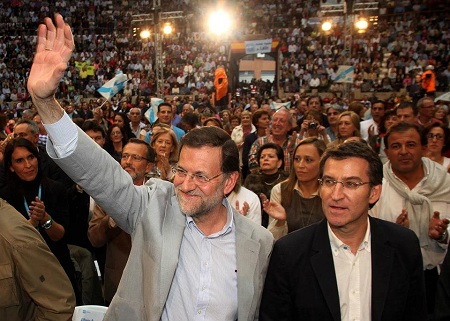Just over 10% of Spain’s population will vote in regional elections this weekend in two key regions, Galicia and Euskadi (the Basque Country), but the elections will play a role in shaping the national politics that affect the remaining 90% of Spain at what’s an especially precarious time for the government of center-right prime minister Mariano Rajoy (pictured above with Galician president Alberto Núñez Feijóo).![]()
![]()
![]()
![]()
Although Rajoy’s Partido Popular (PP, People’s Party) only recently came to power in November 2011, after the eight-year government of prime minister José Luis Rodríguez Zapatero and the center-left Partido Socialista Obrero Español (PSOE, Spanish Socialist Workers’ Party), Rajoy has faced an unenviably difficult climate. Spain’s economy is contracting this year after two years of tepid growth under 1%, which followed a contraction in 2008-09. Unemployment is now just over 25%, among the highest in the eurozone.
Despite the tough economic conditions, Zapatero’s government, and now Rajoy’s government, have been relentless in slashing the Spanish budget. Although Spain ran a fairly tight fiscal policy throughout the 2000s, the drop in tax revenue has resulted in an exploding budget deficit, which Rajoy hopes to reduce to just 6.3% of GDP this year (and 4.5% next year and 3% in 2014), in order to prevent yields on Spanish debt from rising to dangerous levels.
In less than a year, Rajoy has passed at least four different budget cut packages, including a raise in the Spanish income tax rate, a 3% hike in the Spanish value-added tax from 18% to 21%, the elimination of tax breaks for home owners and spending cuts for education and health care. Furthermore, each of Spain’s regions are responsible for cutting their own budgets to just 1.5% of GDP.
Although Rajoy campaigned on a promise not to seek any bailouts from the European Union, like Greece has done, everyone in the EU believes it’s only a matter of time before Rajoy requests one — the European Central Bank has already provided emergency funding to prop up Bankia and other beleaguered Spanish banks in June. Unlike with Greece, however, the most likely path for a Spanish bailout would be through a temporary credit line through the European Stability Mechanism, triggering the purchase of Spanish debt by the European Central Bank.
So on Sunday, when election results roll in from Galicia and Euskadi, here are six items to consider about how the results could affect the Rajoy government and Spain’s national politics: Continue reading Six ways in which Sunday’s Galician and Basque elections will affect the Rajoy government

